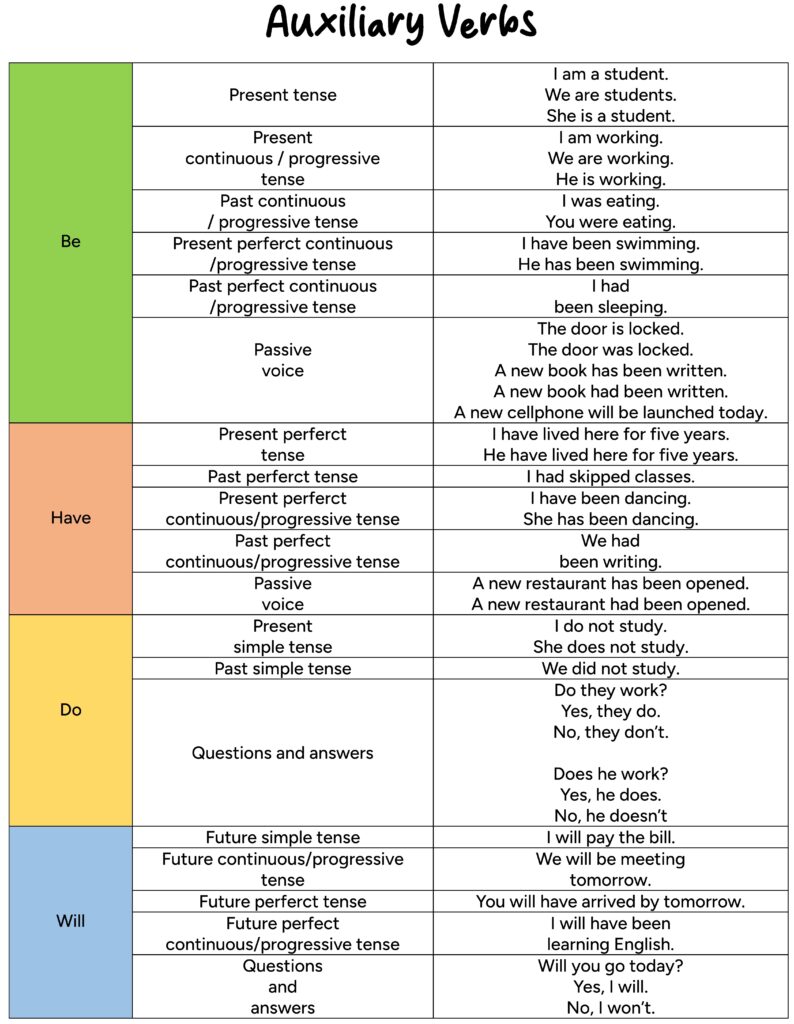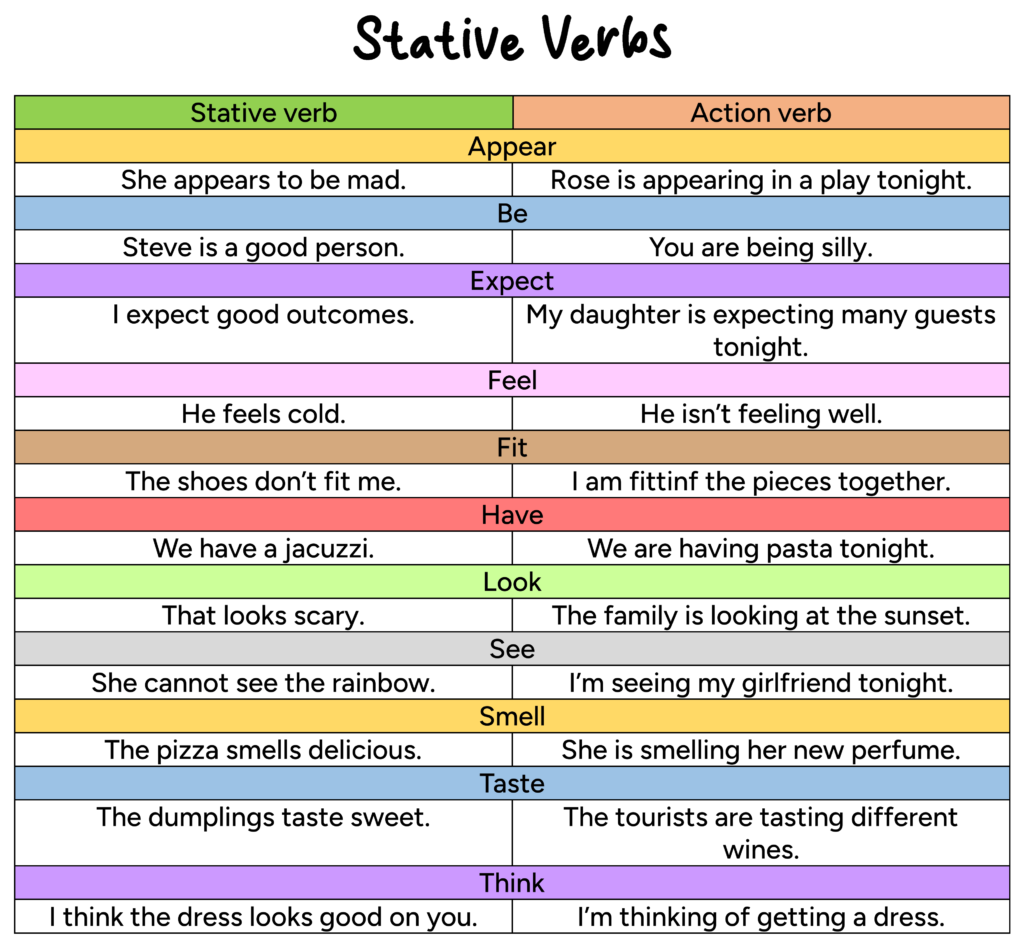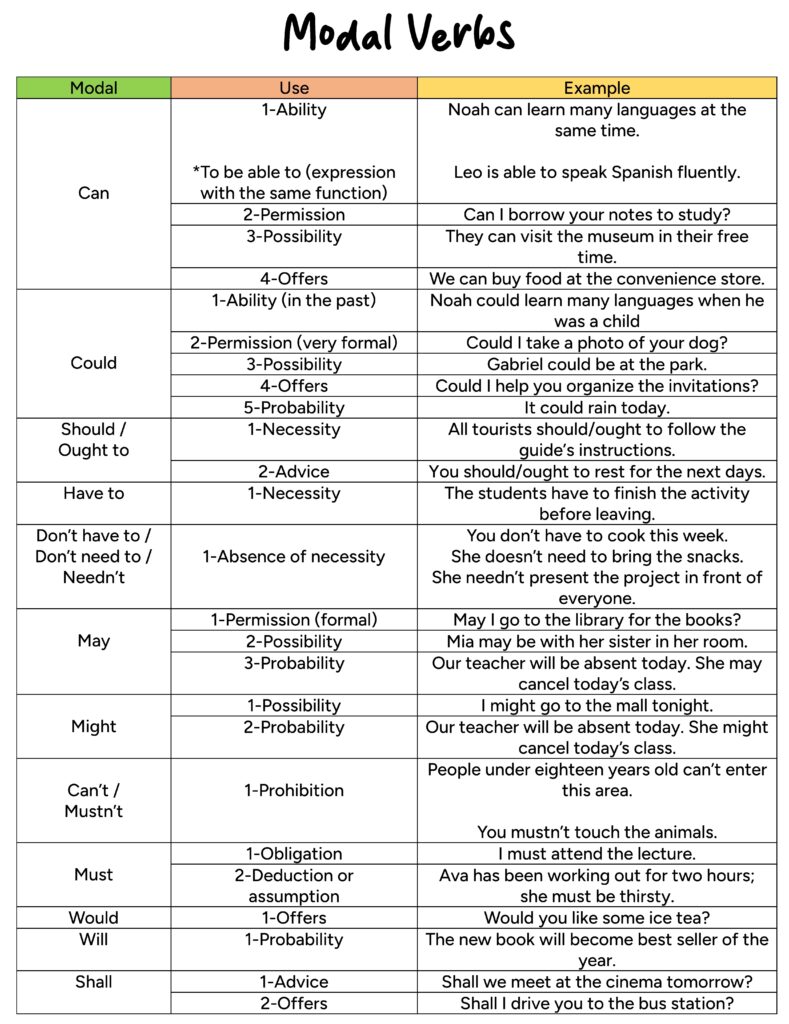In this section you will find information about the different types of verbs.
What are the types of verbs?
Auxiliary verbs
Auxiliary or helping verbs are used together with the main verb of a sentence. The auxiliary verbs are be, have, do, and will.

Stative verbs
Stative verbs are other types of verbs describe states not actions; they describe emotions, thoughts, senses, possession.
For emotions: amaze, astonish, care, envy, like, dislike, love, hate, prefer, surprise, want, need, mind.
I love his new music album.
For thoughts: agree, believe, doubt, desire, forget, guess, hope, know, imagine, mean, suppose, realize, remember, think, understand, wish.
I understand what you mean.
For senses: appear, feel, hear, look, see, smell, sound, seem, taste, touch.
The fresh air in the morning feels great.
For possession: belong, have, own, possess.
I have six siblings.
More stative verbs: consist, contain, cost, exist, fit, matter, owe, resemble, suspect, measure, weigh, deserve.
Notes
We cannot use stative verbs in the progressive tenses; however, we can use some verbs in the progressive tense with another meaning.

Action verbs
Action or dynamic verbs are other types of verbs that describe actions that a person, animal or object can perform; we can use them in all tenses.
Common action verbs: walk, run, jump, write, swim, read, talk, change, cook, dance, watch, kick, speak, sing, travel, etc.
Tim is running.
I speak Korean.
She was kicking the ball.
Transitive verbs
Transitive verbs are other types of verbs that need to have a direct object so that the meaning of a sentence is completed.
I brought.
I brought a gift.
The first example is lacking meaning; the other example is not, the meaning is complete; it makes sense.
Transitive verbs: love, enjoy, bring, buy, pay, send, get, make, bake, give, play, ask, answer, grab, etc.
Types of intransitive verbs
1-Monotransitive verbs just take one single direct object.
My friend paid the bill.
He grabbed the bags.
I bought sushi.
2-Ditransitive verbs take both a direct object and an indirect object.
Michael gave me the cake.
During the activity, the teacher assigned each student a role.
Vicky lent Tony her notes.
3-Tritransitive verbs takes three objects, although the last object is actually a prepositional phrase.
I baked Mark a cake for his birthday.
I gave my mom a hug to make her smile.
Intransitive verbs
Intransitive verbs do not need a direct object to complete the meaning of a sentence.
I fell.
We have arrived.
The boy jumped.
Intransitive verbs: appear, arrive, cough, die, happen, rain, snow, laughed, disappear, vote, play, run, walk, eat, belong, collapse, exist, go, happen, laugh, smile, sit, sleep, stand, etc.
Intransitive verbs are usually followed by prepositional phrases or adverbial phrases to give more information.
The children fell on the ground.
Ann’s dog ran through the park.
I slept for nine hours.
Linking verbs
Linking verbs connect the subject of a sentence to a noun, pronoun or adjective (subject complement). They do not indicate an action; they describe a state of being.
My mom is beautiful. (subject complement = predicate adjective)
My brother became an engineer. (subject complement = predicate noun)
Linking verbs: be, become, appear, seem, feel, get, grow, look, sound, taste, smell, touch, turn, stay, remain, prove.
Those linking verbs describe certain aspect regarding:
1-The verb to be: be, a, is, are, was, were, been, being.
We were shocked.
She is my best friend.
They are teachers.
2-State of being: become, seem, stay.
I became an English teacher after studying for years.
You seem nervous.
They stayed calm after hearing the news.
3-Sensory: appear, feel, look, sound, taste, smell, touch.
Angela’s mom doesn’t look happy.
His reply sounded bitter.
The enchiladas taste delicious.
4-Development: get, grow, turn, prove, remain.
They remained best friends forever.
Notes
You cannot use adverbs with linking verbs. But, if an adverb or intensifier modifies the subject complement, then you can use it.
I feel incredibly stupid.
The dress looks so pretty.
Modal verbs
Modal verbs are other types of verbs that cannot be conjugated; we use them to indicate modality within a sentence: ability, necessity, permission, obligation, possibility.
These are the modal verbs: can, could, may, might, should/ought to, would, will, shall.
How to use modal verbs
-Modal verbs go after the subject and before the main verb.
I can play basketball.
We should start a business.
I must attend the last class.
-The ‘-s’ is not added to modal verbs in the third person singular (he – she – it).
She cans climb that mountain. Wrong
She can climb that mountain. Correct
-In negative sentences ‘not’ is added to the modal verb.
They can’t / cannot swim.
She couldn’t / could not hear the music.
It may not be difficult to travel.
We might not go shopping tomorrow.
You shouldn’t / should not drink that much coffee.
I wouldn’t / would not want to miss such opportunity.
Nicole won’t / will not attend the party.
We shall not make such remarks.
You don’t need to repair the car.
You needn’t come right away.
He doesn’t have to buy many boxes.
-To make questions, you start with the modal verb; you do not need auxiliary verbs.
May I go now?
What would you like to order? (the modal verb comes after wh- questions)
Uses of modal verbs
Some modal verbs can be used in the past (past modals). In addition, examples will be included in the following explanation:
1-Ability: it refers to someone’s ability to do something.
Present: Noah can learn many languages at the same time.
Past: Noah could learn many languages when he was a child.
2-Inability: it refers to an action that someone is not able to do.
Present: Emma can’t read.
Past: Emma couldn’t read when she was a child.
*There is another way to express ability and inability: to be able to.
To be able to is not a modal verb but rather an expression that has the same function. It can be used in the present, past and future.
Leo is able to speak Spanish fluently. (present)
Anna was able to organize her own party last Saturday. (specific time in the past)
I will be able to sing again. (future)
3-Necessity: it refers to a duty or order that is necessary to do.
Should / ought to
Present: All tourists should/ought to follow the guide’s instructions.
Past: You should/ought to have arrived on time.
*Have to is not a modal verb but rather an expression that has the same function of necessity. It mostly used when someone else has a necessary instruction for you to follow.
Present: The students have to finish the activity before leaving.
Past: He had to attend an important meeting with his boss.
4-Absence of necessity: it refers to something that is not necessary to do.
Don’t have to
Present: You don’t have to cook this week.
Past: You didn’t have to buy her uniform. The school gives it for free.
Don’t need to
Present: She doesn’t need to bring the snacks.
Past: You didn’t need to apologize for the mistake.
Needn’t
Present: She needn’t present the project in front of everyone.
Past: I needn’t have studied all night. We didn’t do the test.
5-Permission: these modal verbs give permission. It indicates that someone is allowed to perform an action.
Modal verbs to ask for permission: can, could and may.
Can
Can I borrow your notes to study?
Could (very formal)
Could I take a photo of your dog?
May (formal)
May I go to the library for the books?
Modal verbs to give permission: can.
Can
Present: You can invite as many people as you want to the barbecue.
Past (+): They could have biscuits after finishing their homework when they were in primary school.
Past (-): Bonnie couldn’t go to the carnival without her parents when she was younger.
6-Prohibition: it refers to actions that are against the rules. You cannot do those actions.
Can’t / Mustn’t
People under eighteen years old can’t enter this area.
You mustn’t touch the animals.
6-Obligation: it implies a strong necessity imposed by someone or by the speaker.
Must
The final project must be given to the manager.
I must attend the lecture.
7-Possibility: it refers to the possibility of an action happening.
Can
They can visit the museum in their free time.
Could
Gabriel could be at the park.
May
Mia may be with her sister in her room.
Might
I might go to the mall tonight.
Past forms
Can’t/cannot have
You can’t have decorated the living room by yourself.
Could have
Charlotte could have been fired because of her irresponsibility.
May have
My parents may have missed their flight due to the terrible traffic.
Might have
He can’t enter the office. He might have forgotten his ID.
8-Advice: they are used to make suggestions to someone else.
Should / ought to
Present: You should/ought to rest for the next days.
Past: You should /ought to have applied for the scholarship.
Shall
Shall we meet at the cinema tomorrow?
9-Offers: they are used to make invitations or to offer something to someone else.
Can
We can buy food at the convenience store.
Can I get you something to eat?
Could
She could give you all the materials you require.
Could I help you organize the invitations?
Would
Would you like some ice tea?
Shall
Shall I drive you to the bus station?
10-Probability: it refers to the strong likelihood of something happening.
Will
The new book will become best seller of the year.
11-Deduction or assumption:
Must
Ava has been working out for two hours; she must be thirsty.
Can’t / Couldn’t
Gracie can’t be in her room; she went out.
Could
It could rain today.
May / Might
Our teacher will be absent today. She may/might cancel today’s class.
Past forms
Must have
Daniel is sad; he must have argued with his parents.
She was covered in snow; it must have been snowing.
Can’t have / Couldn’t have
Felix can’t/couldn’t have eaten the last piece of cake; he doesn’t like desserts.
Could have
She could have received bad news; she is disappointed.
May / might have
Dad’s cellphone is on the table; he may/might have forgotten it when he left.

Phrasal verbs
Phrasal verbs are other types of verb that are commonly used in English; they are verbs that have either a preposition, an adverb, or a combination of both; they function as a unit and the meaning of the original verb changes completely.
Break up = to end a relationship, friendship
Come down with = fall ill
The preposition or adverb is known as the particle of the phrasal verb.
Types of phrasal verbs
Transitive phrasal verbs: require a direct object so that the meaning of a sentence is completed.
You have to take off your shoes when you enter the house.
Intransitive phrasal verbs: do not require a direct object so that the meaning of a sentence is completed.
Your sister needs to calm down.
Separable phrasal verbs: they refer to those phrasal verbs which can be separated and the direct object can be between the verb and the preposition or adverb (particle).
I’ll call Sam back.
Inseparable phrasal verbs: they refer to those phrasal verbs which cannot be separated and the direct object comes after the phrasal verb.
Caleb is getting off the bus.
Note: There are transitive phrasal verbs that can be separable or inseparable; you have to learn them by heart.
Word order notes
1-For separable phrasal verbs: if the direct object is a pronoun, you must put the pronoun between the verb and the particle.
I turned it on. Correct
I turned on it. Wrong
2-Prepositional phrases: for phrasal verbs that have a preposition, the direct object must come after the particle.
I need to cut down on fast food. Correct
I need to cut down fast food on. Incorrect
Regular verbs
Regular verbs are other types of verbs that follow some rules that change their form in the past and past participle. The most common change that these verbs undergo are adding ‘-ed’ or ‘-d’.
Spelling rules for regular verbs
1-The majority of verbs end in ‘-ed’ or ‘-d’.
| Infinitive | Past | Past participle |
| To talk | Talked | Talked |
| To clean | Cleaned | Cleaned |
| To cook | Cooked | Cooked |
2-There verbs ending in ‘-e’; you add ‘-d’
| Infinitive | Past | Past participle |
| To smile | Smiled | Smiled |
| To close | Closed | Closed |
| To love | Loved | Loved |
3-There are verbs that end in ‘-y’ and have a consonant before it; you replace the ‘-y’ for ‘-ied’.
| Infinitive | Past | Past participle |
| To deny | Denied | Denied |
| To fry | Fried | Fried |
| To carry | Carried | Carried |
4- There are verbs that end in ‘-y’ and have a vowel before it; you add ‘-ied’.
| Infinitive | Past | Past participle |
| To employ | Employed | Employed |
| To stay | Stayed | Stayed |
| To betray | Betrayed | Betrayed |
5-There are verbs that follow the structure: consonant + vowel + consonant; you have to double the last letter and add ‘-ed’
| Infinitive | Past | Past participle |
| To beg | Begged | Begged |
| To rob | Robbed | Robbed |
| To plan | Planned | Planned |
However, when the words end in h, j, x, y and w, you do not double the last word.
| Infinitive | Past | Past participle |
| To laugh | Laughed | Laughed |
| To fix | Fixed | Fixed |
| To bow | Bowed | Bowed |
6-When there are verbs with the stress on the last syllable, you have to double the last consonant and add ‘-ed’.
| Infinitive | Past | Past participle |
| To regret | Regretted | Regretted |
| To submit | Submitted | Submitted |
| To occur | Occurred | Occurred |
Irregular verbs
Irregular verbs are those which are written in a completely different way because they do not follow any rules; therefore, you need to learn them by heart.
Different groups of irregular verbs
1-There are verbs that remain the same in their base form, past simple and past participle.
| Infinitive | Past | Past participle |
| To hit | Hit | Hit |
| To cost | Cost | Cost |
| To set | Set | Set |
2-There are verbs that are the same in the past simple and in the past participle.
| Infinitive | Past | Past participle |
| To think | Thought | Thought |
| To seek | Sought | Sought |
| To lose | Lost | Lost |
3-There are verbs are the same in the infinitive form and past participle form.
| Infinitive | Past | Past participle |
| To come | Came | Come |
| To overcome | Overcame | Overcome |
| To run | Ran | Run |
4-There are verbs that differ in their base form, past simple and past participle.
| Infinitive | Past | Past participle |
| To be | Was | Been |
| To sing | Sang | Sung |
| To break | Broke | Broken |
Important notes
There are verbs that can be regular in American English (AE) and irregular in British English (BE), both are correct.
| Infinitive | Past | Past participle |
| To dream | AE: dreamed / BE: dreamt | AE: dreamed / BE: dreamt |
| To learn | AE: learned / BE: learnt | AE: learned / BE: learnt |
| To burn | AE: burned / BE: burnt | AE: burned / BE: burnt |
Also, there are verbs that can be regular in British English and irregular in American English, both are correct.
| Infinitive | Past | Past participle |
| To get | Got | BE: got / AE: gotten |
| To light | AE: lit / BE: lighted | AE: lit / BE: lighted |
More about verbs here.